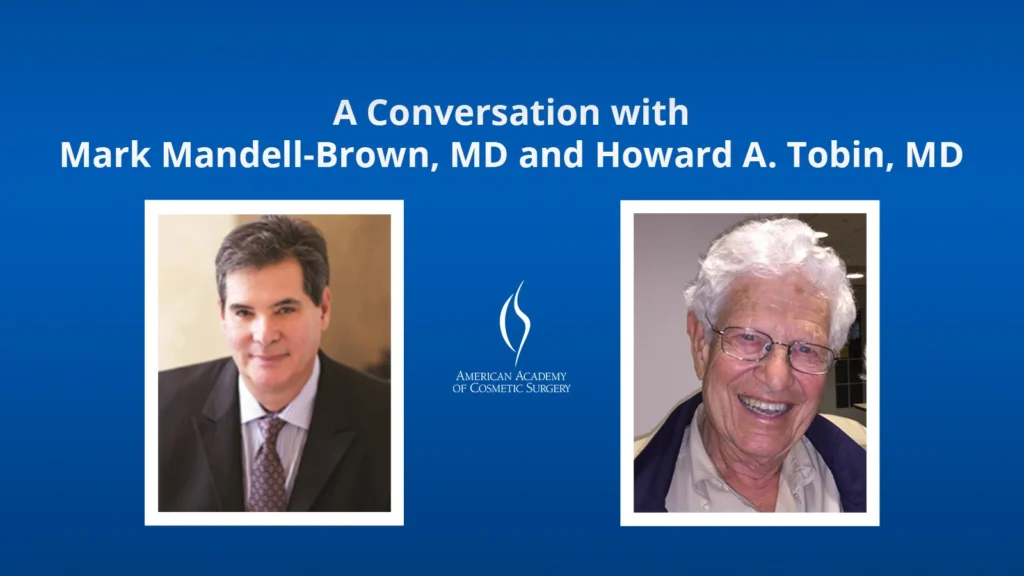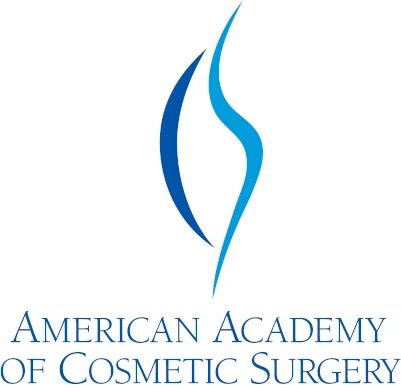
A founding member and former president of the AACS (1993–1995), Dr. Howard Tobin has offered Fellowship training under the AACS Certified Fellowship program. His was one of the earliest programs, having chaired the AACS Fellowship Committee at its inception. His Fellows have perpetuated his legacy, achieving highly successful practices and serving in leadership positions in the Academy and the American Board of Cosmetic Surgery.
This is the very first The Consult video conference, a conversation between Dr. Mark Mandell-Brown and Dr. Howard Tobin, founding member of the American Academy of Cosmetic Surgery.
Dr. Mark Mandell-Brown: My first question is, how did you transition from a head and neck surgeon into a cosmetic surgeon?
Dr. Howard Tobin: There were quite a few factors that entered into it. First of all when I was a practicing cancer surgeon, of course there was a lot of reconstruction involved, so the surgical procedures weren’t really much of a challenge. I had been exposed to some cosmetic surgery in my residence residency and in my Fellowship we did rhinoplasties and some facelifts, so it wasn’t entirely new to me. As I was doing more and more reconstructive surgery, I was kind of looking at where I was heading. I practiced in a relatively small city and I could see a change in in head and neck surgery — my bread and butter operation was thyroidectomies– and a lot of those were being treated medically. A lot of patients were starting to go to major medical centers because chemotherapy was getting introduced. Although I actually used to give my own chemotherapy, I could see a change on the horizon, so I began emphasizing more of the facial plastic procedures. Then, I had a rare opportunity to travel to China with Dr. Richard Webster for several weeks. We were teaching at the plastic surgery hospital in Beijing and as I spent time and got to know Richard, he steered me towards cosmetic surgery. After I came back from that trip, liposuction was just being introduced, so I went out to California where Dr. Julius Newman was putting on a course. I went down and visited a fellow who became really one of my closest friends, Dr. Gary Fenno. He taught me liposuction and then I I told him that I was limiting my practice to cosmetic surgery and the rest was history!
Dr. Mark Mandell-Brown: You’re one of the founding fathers of the AACS. If you were going to give a two-sentence description of a couple of the key people, who would you pick and what would you say in just a couple sentences about each one?
Dr. Howard Tobin: Dr. Richard Webster of course is predominant in our academy, he was a plastic surgeon who was disenchanted with the plastic surgeon’s approach to cosmetic surgery
Dr. Julius Newman was a firebrand! He stimulated a lot of people and I was very close to him. I think he did an awful lot to develop our society.
Then in the facial plastic realm, Dr. Beacon was one of the ones that really stimulated me.
Another one was Dr. Jack Anderson, who was very encouraging to me.
Those are those the ones that come to mind initially. There were a lot of others, but those were the ones that I think influenced me more than anybody else.
Dr. Mark Mandell-Brown: If you had to pick a favorite procedure cosmetic procedure what would that be?
Dr. Howard Tobin: The two that I really like the best are rhinoplasty and breast reduction, I like breast reduction because the patients love it so much.
You started a Fellowship training program; any idea how many fellows Dr. Howard Tobin has trained in Texas?
I think we’ve trained somewhere between 15 and 20 people.
Dr. Mark Mandell-Brown: Can you just name a few of your fellows who have gone on to become active with the Academy?
Dr. Howard Tobin: Dr. Angelo Cuzalina was one of my early fellows and he’s had a very prominent role in the Academy and on the Board.
Dr. Jay Abby who is just a beautiful wonderful also he’s almost like family to me now and of course he’s made tremendous contributions to the to the board.
Dr. John Perenack was an excellent one he went on to teach down at LSU and has made quite a name for himself.
Several others but those are the ones that come to mind.
Dr. Mark Mandell-Brown: Did you have any idea that they would be the stars that they would later become while they were doing your Fellowship?
Dr. Howard Tobin: You can tell when they’re training. You know there’s some people who are natural surgeons and there’s some people who struggle. There’s some people who are devoted to what they’re doing there’s something when you really wonder whether they’re really motivated enough, so yes you can tell, and you can tell pretty quickly.
Dr. Mark Mandell-Brown: Do you have any particular story of one of your favorite outcomes?
Dr. Howard Tobin: I’m always reminded of a young girl that came in and she had a very marked asymmetry for breasts; one breast was very large and one breast was plastic. It was a challenging case of an augmentation. She then came in maybe three or four months after her surgery and she said, “Dr. Tobin, I never told you thi,s but you totally changed my life! I was married to an abusive husband and because of my appearance, I was afraid to get out of the marriage. Now I’m with this new guy and I’ve got a wonderful boy and I’ve got a whole new life ahead of me!” That’s the kind of experience that makes you realize you’re really doing something worthwhile and it’s important for people to realize that we can have positively impacts on their lives.
Dr. Mark Mandell-Brown: If you were going to compare your interest in flying, what are the attributes that make a good pilot as well as a good surgeon?
Dr. Howard Tobin: It’s very interesting because what I have been learning from flying is we have an aviation checklist and flying is a real discipline. Surgery is a discipline too. If you want to be an expert pilot, keep training — you’ve got to keep flying, studying, and listening. If you want to be a great surgeon, you’ve got to do the same thing. You’ve got to study, try, watch what other people do, and learn from your own experience. I see more similarities than differences. Flying is a passion of mine; it always has been, and it still is.
Dr. Mark Mandell-Brown: If a young or any member of our academy should come and visit you in Abilene, Texas, where would you take them out for a world-class dinner?
Dr. Howard Tobin: I might take them out to Perini’s which is well known throughout the country. Tom Perini cooked for President Bush, so he’s well known. I might also bring him out to my ranch; we’d cook some brisket and some ribs and then we’d really have a Texas dinner!
Dr. Mark Mandell-Brown: Now you’re talking, Dr. Tobin! Based on your experience, wisdom, and knowledge, what are the top three things you would tell a cosmetic surgeon in 2021?
Dr. Howard Tobin: First, if you’re going to go into this field nowadays, you need good training this means a Fellowship Program; it’s no longer the old Wild West when I started when we had nothing but self-training. Now we do have good training so I think you’ve got to take a Fellowship Program to really get into this field.
The second thing I think is that you’ve got to be true to yourself. Do what you know you can do well and do what you think is best for the patient. Don’t chase the buck! You’ll make a good living in this field. You don’t have to get wealthy to be satisfied in life. It’s a tough competitive field now and we’ve gotten more and more dependent on marketing. I understand marketing has become important in building up a practice, but don’t be fooled by your marketing! It’s just an opportunity to get a patient to come in and visit you. From then on in, you’re not selling you’re offering a service.
My advice is to be true to yourself, be true to your patients, do what you know you can do well, get good training, and keep training, training, and training! I think that’s the best advice I can give!
Dr. Mark Mandell-Brown: What would be the one instrument one instrument that Dr. Howard Tobin absolutely could not give up?
Dr. Howard Tobin: The Bovie — pretty much everything I do is with a Bovie.
Dr. Mark Mandell-Brown: It true that you have some instruments that you inherited from Dr. Richard Webster?
Dr. Howard Tobin: Yes, I do. His wife Cleo gave them to me after Richard had died and I have them in a little box frame in my office, it’s something I really treasure.
Dr. Mark Mandell-Brown: I actually have had the opportunity and pleasure to visit Dr. Tobin. He has a beautiful office in Abilene, a beautiful surgery center that’s accredited and I saw Dr. Webster’s box frame on the wall as I was visiting and I took a photograph of it — but i’d have to go back through the albums and check out where it is. I was very impressed that you had it and they looked like they were very memorable items worth keeping.
Dr. Mark Mandell-Brown: In our final wrap up, what advice would you give to the leadership of AACS?
Dr. Howard Tobin: It may sound a little self-serving but I think we’re tending to forget history. I don’t want you to feel like I’m neglected, I’m really I’m very content with my life and my position — but I I think I think the academy is losing sight of history to a certain extent. A lot of us older guys aren’t going to be around much longer and in fact ,I may be the oldest active member of the academy right now. There is so much that us older surgeons can talk about and teach and it’s not just new procedures and it’s not just technique. A lot of it is based on what we’ve learned over many years and many hundreds or perhaps thousands of procedures. Not everything that is new is great — I mean one of the things I think about is liposuction. I’ve often thought I’d like to give a lecture on liposuction and what I’d be telling people is I don’t do anything different than I did 35 years ago and it still works great. So I would say, don’t lose track of history, it’s an important part of the future now.
Dr. Mark Mandell-Brown: Those are wise words. Two years ago at our national conference we were fortunate to have about 16 or 17 of our past presidents involved with the Annual Scientific Meeting and I’m hoping we can continue that tradition. Thank you very much Dr Tobin for sharing a few highlights with us tonight. It’s always a pleasure speaking to you and I hope to see you soon!
